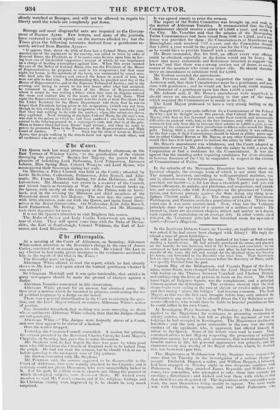Zbe IfIctropolis.
At a meeting of the Court of Aldermen, on Saturday, Alderman White called attention to the Recorder's charge in the case of James Curley, convicted of an assault upon his wife. He wished Mr. Law to say whether he had really given utterance to the sentiments ascribed to him iii the report of the trial in the Times ?
The Recorder made no reply. Alderman White offered to read the report, which he had already shown to Mr. Law ; and again asked the learned gentleman whether it was Correct?
Sir Chapman Marshall said it was quite intolerable, that articles in party newspapers should be made the ground of charges against a Judge.
Alderman Venables concurred in this observation.
Alderman White pressed for an answer, but obtained none. He then read a motion w hich he intended to propose, condemning the use of political hinguage by a Judge on the bench.
There was a general disinclination in the Court to entertain the ques- tion, and the Lord Mayor refused to receive Alderman White's notice of motion.
Tne Recorder reniarleed, that nothing was more annoying to those vile se sentiments Alderman White echoed, than that the Judges should act independently.
Alderman White—" The Judges were formerly slaves of a Court, and now they appear to be slaves of a faction."
Here the matter dropped.
Yesterday the Common Council assembled. A motion for printing the sermon preached by the Reverend Charles Calm', the Lord Mayor's Chaplain, on Saturday last, gave rise to some discussion. Mr. Stephens said, he had hoped the time was gone by when good men who differed from the Church of England were to be lashed from the pulpit. Ile had me read the serniou, but he should wish to see it befOre agreeieg to the cit,tomary vote of fifty guineas.
Mr. Burton concurred with Mr. Stephens.
Mr. Pewtress said, the sermon appeared to be disagreeable to the Court of Aldermen, who were warmly attached to the Church ; and it certainly could not please Dissenters, who were unmercifully lashed in It. For his part, he se luhon went to church, not liking the manner in which theological subjects were didal-,ed there. Ile wished every menile•r to read Mr. tutor's sermon, :aid if his religious feelings and his Christian charity were improved by it, he should be very much surprised. It was agreed simply to print the sermon. The report of the Police Committee was brought up, and read, on the motion of Alderman Venables. It recommended that the Chief Commissioner should receive a salary of 1,0001. a year, and reside in the City. Mr. renables said that the salaries of the Metropolitan Police Commissioners had been raised from SOO/. to 1,200/., and a resi• denee was provided for them; the Commissioners at Manchester atia Birmingham each received 700/. a year, and the Committee thought that 1,000/. a year would be the proper sum for the City Commissioner as he would have to provide himself with a residence. Mr. Brace contended, that for Ka, an officer every way efficient could be obtaihed, especially as the duties would not be heavy. Re knew that many economists and Reformers intended to support "the lawyer," and that there was a strong anxiety out of doors, to see the names of the members who voted on either side. He should therefore move an amendment to substitute SOU for 1,000/.
Mr. Godson seconded the amendment.
Mr. Pewtress and Mr. Anderton supported the larger sum. Ms Anderton said, that their Commissioner must be a gentleman, and ant. date with gentlemen ; and he would ask how anybody could maintain the character of a gentleman upon less than 1,000/. a year?
Mr. Ashurst said, it' Mr. Brace's amendment were negatived, he should move an amendment disagreeing to that part of the repon which required the Commissioner to reside in the City. The Lord Mayor professed to have a very strong feeling on this subject— He thought SOO/. a year quite sufficient for a Commissioner of the Police of the City ; and he thought so on this ground, that Colonel Rowan and Mr.
Mayne, with four or five thousand mmmcii under their control, and innumerable
difficulties to contend with, bad, in the first instance, only 800/. a year. Go. yernment had only been able to increase their salaries to 1,200/. a year, in con. sequence of the extension of their jurisdiction to fifteen miles round the Metro. polls, Taking 8004 a year as quite sufficient, and certainly it was sufficient for the first year, if their Commissioner should in talent or ability prove sage. rior to either Colonel Rowan or Mr. Mayne, or any other Commissioner, they would then have it in their power to increase the salary by 100/. or 200/.
Mr. Brace's amendment was withdrawn, and the Court adopted an amendment moved by Mr. Ashurst—that the salary be soul, a year, the Corporation to find a residence for the Commissioner. It was also agreed that the standing order requiring candidates for civic situations to become freemen of the City be suspended in respect to the election of Commissioner of Police.


























 Previous page
Previous page